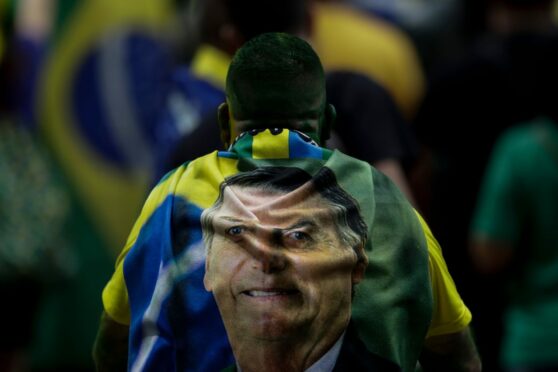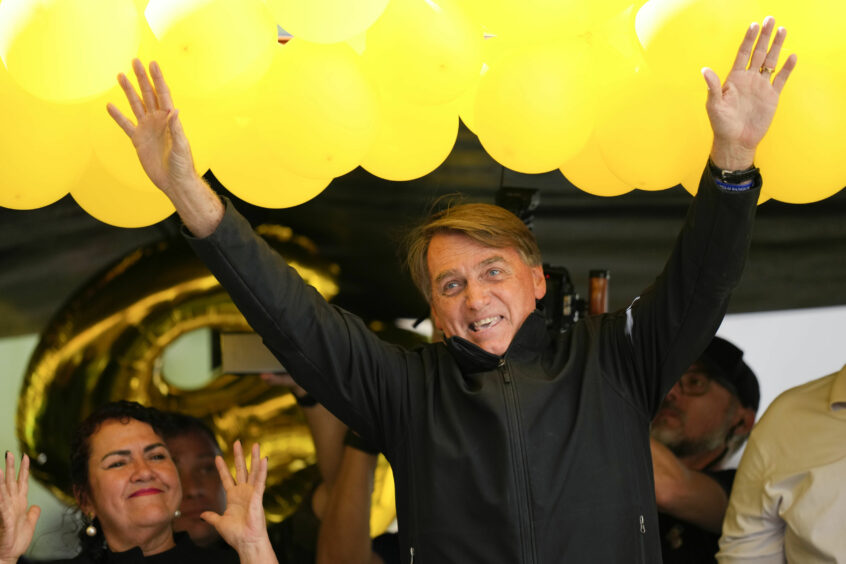
Nicknamed the “Tropical Trump”, populist Brazilian president Jair Bolsonaro could plunge South America’s biggest democracy into chaos if he carries out threats not to respect the result of presidential elections in October.
The far-right-wing politician has hinted he might be prepared to repeat the actions of his political hero, Donald Trump, who claimed the 2020 United States presidential election was rigged. Weeks after the disputed vote, Trump’s supporters ransacked the Capitol in January last year.
Bolsonaro has escalated his attacks on Brazil’s voting system and called on hardcore supporters to demonstrate in the streets before the October 2 vote.
The president, who won victory in 2018, has also criticised Brazil’s electronic voting system, claiming it was flawed and open to fraud.
Bolsonaro failed to pass a measure in the Brazilian Congress on August 9 to reintroduce paper ballots.
The former army captain has also attacked Supreme Court justices who oversee elections, accusing them – without evidence – of favouring his leftist rival.
In response, leading Brazilians, from top bankers to union leaders, signed a manifesto organised by Sao Paulo’s confederation of industries expressing support for the judiciary.
They called the Supreme Court the “ultimate guardian of the constitution” and insisted the Superior Electoral Court has conducted the country’s elections with integrity.
Thousands demonstrated in 23 of the country’s 26 cities earlier this month.
Protesters carried banners with slogans such as “dictatorship – never again” and “respect the vote”.
A series of polls have suggested Bolsonaro will lose to the leftist former president Luiz Inácio Lula da Silva in the first or second round of voting.
The first round takes place on October 2 and if no candidate wins 50% of votes needed to automatically become president then a second round will take place on October 30.
Perhaps most alarmingly, Bolsonaro, who trails Lula in the polls by about 10% has previously said he “may not accept the result” of the elections.
The Brazilian president has given several retired generals posts within the current government and might try to count on the support of elements within the armed forces if he challenged the election result, analysts said.
Brazil has a grim history of dictatorship between 1964 and 1985 when the army ran the country before retiring to barracks when democracy was restored.
More than 400 people were killed or disappeared during Brazil’s long military rule and officers were protected from prosecution by an amnesty law when the country returned to democracy.
As in other countries which have long military dictatorships, Brazilians are very sensitive to the prospect of a return to the dark days when the generals were in charge.
“We are demonstrating as we have seen an escalation of authoritarianism, with Bolsonaro threatening not to respect the result of the presidential elections – that is not respecting the popular sovereignty of the vote,” Raimundo Bonfim, of the Centre for Popular Movements, who helped organise the demonstrations against Bolsonaro, told The Sunday Post. Almost a million Brazilians, including leading figures from the world of business, politics, science and the arts, have signed a declaration to safeguard the nation’s democracy.
The manifesto, which was inspired by a historic 1977 declaration denouncing Brazil’s then dictatorship, says the country is facing a “moment of immense danger to democratic normality”.
Any attempt to incite violence or back “a rupture with constitutional order” would be “intolerable”, it warned. “We recently saw how authoritarian follies put the United States’ centuries-old democracy at risk. There, efforts to disrupt democracy and people’s faith in the reliability of the electoral process failed, and nor will they here,” said the document.
Among the signatories are former presidents and musicians including Caetano Veloso – who spent 54 days in jail under the military dictatorship in 1968 – singer Milton Nascimento and the Brazilian pop star Anitta.
Anitta said the election was like the battle in the Harry Potter books between Voldemort, JK Rowling’s Dark Lord, represented by Bolsonaro and Lula as Dumbledore.
Bolsonaro has derided the manifesto for democracy as “some little letter”.
Readings have taken place across Brazil and at foreign universities such as King’s College, London. Hundreds of protest acts are planned in the months ahead.
Bolsonaro won the 2018 election by capitalising on a Brazil which was tired of stagnant politics and corruption.
His brash, everyman style won him the nickname “Tropical Trump” but the initial appeal is fading as he shapes up against his rival Lula for the election battle.
Diehard supporters love his anti-establishment message and his common touch on social media.
Critics loathe his divisive narrative with its disdain for political correctness, which often provoke accusations of racism, sexism and homophobia.
Crucially, Bolsonaro has lost a great deal of support among the political centre and business sectors. His handling of the pandemic, in which he mocked advice insisting vaccines could “turn you into an alligator”, drew much criticism. Brazil’s death toll of 680,000 was second only to the United States.
He faced international outcry over the destruction of the Amazon rainforest, which has surged during his presidency.
“It seems that Bolsonaro is following the script of Trump in the sense that he is threatening not to accept the election result if Lula wins,” Anna Ayuso, senior investigator in Latin American politics at the Barcelona Centre for International Affairs in Spain, told The Sunday Post.
Dr Ayuso said that if there is a close election result then it might present a “very dangerous” situation but if Lula wins a clear victory the chances of Bolsonaro challenging this result would be little or none.
“Bolsonaro has incorporated retired generals into his government, so he has elements of the army on his side. But there is no chance of the army staging a coup because most of the officers would not accept that,” she said.
“Brazil is not Nicaragua. There are too many legal checks and balances and there is no will to undermine the government.”
Dr Ayuso said Bolsonaro was supported by some reactionary elements of the business community involved in deforestation in the Amazon but many business leaders supported a centre-left government.
Bolsonaro faces dozens of impeachment requests and a series of corruption scandals involving his inner circle.
Dr Ayuso said she believes the real reason Bolsonaro would challenge any election result is because once he is out of power he and members of his family could face legal problems because of allegations of corruption.
“It is a matter of survival for Bolsonaro,” she said.
respecting the popular sovereignty of the vote,” Raimundo Bonfim, of the Centre for Popular Movements who helped organise the demonstrations against Bolsonaro, told The Sunday Post.
Almost a million Brazilians, including leading figures from the world of business, politics, science and the arts, have signed a declaration to safeguard the nation’s democracy.
The manifesto, which was inspired by a historic 1977 declaration denouncing Brazil’s then dictatorship, says the country is facing a “moment of immense danger to democratic normality”.
Any attempt to incite violence or back “a rupture with constitutional order” would be “intolerable”, it warned.
“We recently saw how authoritarian follies put the United States’ centuries-old democracy at risk. There, efforts to disrupt democracy and people’s faith in the reliability of the (electoral) process failed, and nor will they here,” said the document.
Among the signatories are former presidents and musicians including Caetano Veloso – who spent 54 days in jail under the military dictatorship in 1968 – Milton Nascimento and the Brazilian pop star Anitta.
Anitta said the election was like the battle in the Harry Potter books between Voldemort, JK Rowling’s Dark Lord, represented by Bolsonaro and Lula as Dumbledore.
Bolsonaro has derided the manifesto for democracy as “some little letter”.
Readings have taken place across Brazil and at foreign universities like King’s College London. Hundreds of protest acts are planned in the months ahead.
Bolsonaro won the 2018 election by capitalising on a Brazil which was tired of stagnant politics and corruption.
His brash, everyman style won him the nickname ‘Tropical Trump’ but the initial appeal is fading as he shapes up against his rival Lula for the election battle.
Die-hard supporters love his anti-establishment message and his common touch on social media.
Critics loathe his divisive narrative with its disdain for political correctness, which often provoke accusations of racism, sexism and homophobia.
Crucially, Bolsonaro has lost much support among the political centre and business sectors. His handling of the pandemic, in which he mocked advice insisting vaccines could “turn you into an alligator”, drew much criticism. Brazil’s death toll of 680,000 was second only to the United States.
He faced international outcry over the destruction of the Amazon rainforest, which surged during his presidency.
“It seems that Bolsonaro is following the script of Trump in the sense that he is threatening not to accept the election result if Lula wins,” Anna Ayuso, senior investigator in Latin American politics at the Barcelona Centre for International Affairs in Spain, told The Sunday Post.
Dr Ayuso said that if there is a close election result then it might present a “very dangerous” situation but if Lula wins a clear victory the chances of Bolsonaro challenging this result would be little or none.
“Bolsonaro has incorporated retired generals into his government, so he has elements of the army on his side. But there is no chance of the army staging a coup because most of the officers would not accept that,” she said.
“Brazil is not Nicaragua. There are too many legal checks and balances and there is no will to undermine the government.”
Dr Ayuso said Bolsonaro was supported by some reactionary elements of the business community involved in deforestation in the Amazon but many business leaders supported a centre-left government.
Bolsonaro faces dozens of impeachment requests and a series of corruption scandals involving his inner circle.
Dr Ayuso said she believes the real reason Bolsonaro would challenge any election result is because once he is out of power he and members of his family could face legal problems because of allegations of corruption.
“It is a matter of survival for Bolsonaro,” she said.

Enjoy the convenience of having The Sunday Post delivered as a digital ePaper straight to your smartphone, tablet or computer.
Subscribe for only £5.49 a month and enjoy all the benefits of the printed paper as a digital replica.
Subscribe